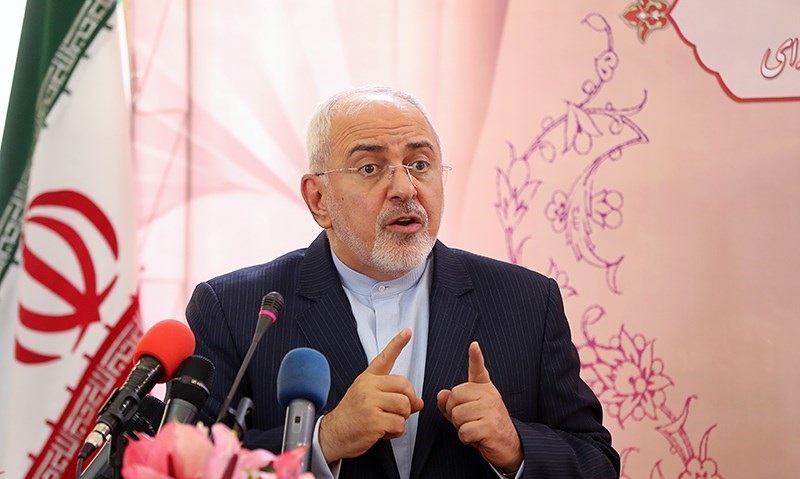Zarif: JCPOA to revive in absence of US
 TEHRAN (Defapress)Zarif made the remarks in an interview with US media 'CNN' on Sunday.
TEHRAN (Defapress)Zarif made the remarks in an interview with US media 'CNN' on Sunday.
It was the first interview with the Western media after US unilateral withdrawal from Iran nuclear deal also known as the Joint Comprehensive Plan of Action (JCPOA) and the re-imposition of sanctions on Iran.
'I believe there is a disease in the United States and that is the addiction to sanctions,' he said.
'Even during the Obama administration the United States put more emphasis on keeping the sanctions it had not lifted rather than implementing its obligation on the sanctions it lifted,' he added.
Zarif retained a clear belief during the hourlong interview held in the Foreign Ministry that the nuclear deal could be revived regardless of the Trump administration denunciation of it.
After Washington's May 8 exit from the landmark Iran Deal, the US gave 90 to 180 wind-down period to other countries before it starts re-imposing oil sanctions on Tehran on November 4. Part of the US illegitimate sanctions were imposed on Iran as of August 9.
Zarif expressed his dismay that the United States has not learned that sanctions are ineffective in changing the political climate in Iran.
'We felt that the United States had learned that at least as far as Iran is concerned, sanctions do produce economic hardship but do not produce the political outcomes that they intended them to produce, and I thought that the Americans had learned that lesson. Unfortunately I was wrong,' Zarif said.
On Sunday, Zarif in a Twitter message dismissed US dreams of launching a coup in Iran similar to that engineered by Washington against the country in 1953.
“65 years ago today, the US overthrew the popularly elected democratic government of Dr. [Mohammad] Mossadegh, restoring the dictatorship & subjugating Iranians for the next 25 years. Now an “Action Group” dreams of doing the same through pressure, misinformation & demagoguery. Never again,” he tweeted.
Elsewhere in his talks with CNN, Zarif rejected the possibility of talks with US administration saying the pressure from the European allies could persuade Trump to change his mind and accused the United States of 'bullying' the European signatories to the deal.
'We do not want to revisit that nuclear deal,' he noted.
'We want the United States to implement that nuclear deal. Today the closest US allies are resisting those sanctions. The US basically arm-twisting -- its attempt to put pressure. I don't want to use the term bullying ... [but] that's what it amounts to,' Zarif reiterated.
Answering a question whether Iranian President Hassan Rouhani should meet with US president Zarif said the previous nuclear deal had to be respected first.
'Not when the previous huge progress that we made was thrown out,' he said of a one-on-one. 'That [previous deal] was for us the litmus test of whether we can trust the United States or not,' he added.
Elaborating on the possibility of establishing lasting agreement with President Trump, he said 'Now if we spend time with him and he signs another agreement. ... How long will it last? Until the end of his administration? Until he departs from the place where he put his signature on the agreement?'
Zarif went on to say that decades of pressure meant the Iranian people would be resistant to this pressure, yet it would have an impact.
'US sanctions have always hurt,' he said.
'What it's hurting, though, is people who want to buy medicine. People who want to buy food.'
The recent economic problems, which have seen the local currency slide and fruit and vegetable prices sometimes double, were due to preparatory measures being taken,' CNN quoted Zarif as saying.
'The economic upheaval that you see right now in Iran is because of the measures that needed to be taken to be prepared for those days, so we are prepared for the worst case scenario,' he added.
'We spent a lot of time' he said, of the yearslong, intense and detailed negotiations that he and then-US Secretary of State John Kerry led.
'It was not an easy political decision for the Iranian government and for me personally and for PresidentRouhani. It may be a credit for some foreign ministers to spend hours upon hours with the US secretary of state but it's certainly not a credit in Iran,' Zarif noted.
'That's what diplomats are for. Part of our salary is to take personal hits for following national interests -- that's what our job is,' the Iranian Foreign Minister said.
message end/
